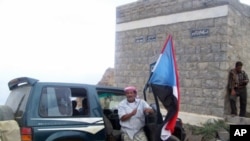“If I have a weapon,” says Madian, a smiling 15-year-old boy carrying grenades and an AK-47, “the government cannot arrest me.”
Madian stands on a rocky hillside in southern Yemen, an area known to many local as “al-Janoob al-Harr,” The Free South. He says 15 men once tried to take his gun, after he attacked a security office with a grenade. When he grows up, Madian wants to be a soldier. He hopes the southern rebellion will start soon.
Technically, the Yaffa region is well within the boundaries of the arid Arabian country, but the Yemeni government does not rule this area. It is controlled by a network of sheiks, and the Southern Movement.
Mohamed Tamah, a Southern Movement leader listens to Madian and looks proud. A crowd gathers. Some say they are soldiers that haven’t been paid by the government in months, years or even decades- a common cause for unrest in Yemen. Others say family or friends were arrested without charges for peacefully protesting what they call the “northern occupation.”
Southern demonstrators are often killed when the army opens fire at the crowds, they say. Most of the people are out of work, and there are not nearly enough teachers to educate their children. They want an independent country.
I ask if that means they all want war. The crowd on the rocky slope roars. The answer is yes. I wonder if the presence of Tamah, a prominent leader, is boosting their enthusiasm for what could be a disaster. In 1994, only four years after northern and southern Yemen united, the south rose up and fought for independence. The war was short and bloody, and the northern government prevailed.
Only hours before, separatist leaders discussed the future of the Southern Movement in the home of Sheik Abdu Alrib al-Naqib. The sheik is the ruler of the area. He wore a brown NY Yankees hat to demonstrate the pro-West posture of the Southern Movement.
Leaders said they thought uniting with northern Yemen was a good idea back in 1990. “We were stupid,” said Tamah. “We didn’t know what was going on in the North.” The northern government used the unity to bleed the south of resources, jobs, and land, Tamah added.
The Yemeni government says Southern Movement leaders are criminals, who use the suffering of ordinary people for personal gain. Southerners are poor, Aden’s deputy governor, Sultan M. al-Shaibi told me in his simple wooden office- but so is the rest of the country.
Later that day, he gave me a tour of the steamy port city in his silver four-wheel-drive. He pointed out new buildings and development projects. “All of this,” he said, waving in the direction of a building under construction, “since the unity.”
Al-Shaibi said the Southern Movement is not strong enough, or popular enough to stage a real rebellion. Peaceful protests are welcomed in Yemen, he said, but violent acts should be treated like any other crimes or threats to the country’s stability.
“Someone just crossing the road and stopping cars and taking people out of their cars in front of their families and killing them?” he said. “Just because they are from here or from there? That’s not the proper thing to do.”
Violence and protests are increasingly commonplace in southern Yemen, and separatists’ efforts are complicated by the presence of al-Qaida. Separatists say they are a secular organization, and have nothing to do with Islamic extremism or al-Qaida. But one can’t help but notice that they do have a shared goal: destabilizing the Yemeni government.
I didn’t point out my observation in the sheik’s house, because the separatists were already on the defense. They said the Yemeni government labels them “al-Qaida” in order to use international anti-terrorism funds to attack separatists.
The leaders also debated whether or not it would be possible to achieve independence without destabilizing the northern government. Most said peaceful protests are not working. Some urged more protests and peaceful secession. Others said a battle was coming- with or without their support.
And although the central government regularly calls for negotiations with the separatists, Yemeni president Ali Abdullah Saleh insists southerners recognize the unity as a condition for the talks. "I am sure that the separatist flags will be burned in the coming days and weeks,” said the president, according to state news in mid-March. “For we have one flag that we have agreed upon at our own free will.”
But only minutes outside the military checkpoints that surround Aden, flags of the former south Yemen are painted on mountainsides, buildings, water-tanks and doors. “The Free South” and the slogan “A home we don't protect, we don't deserve!” are spray-painted on empty walls and rocks.
And as Tamah walks through a crowd of fans on the breezy mountaintop, his position becomes clear. “See, every old man wants to participate in the war,” he says. He asks if I would like to take at turn at shooting his friend’s AK-47. I decline.











